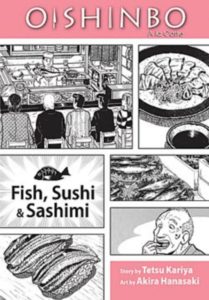 In a welcome change of pace for the series, the stories collected in this volume focus more on fundamentals than extravagant ingredients.
In a welcome change of pace for the series, the stories collected in this volume focus more on fundamentals than extravagant ingredients.
Creative Staff
Writer/Artist: Tetsu Kariya and Akira Hanasaki
Translation: Tetsuichiro Miyaki
What They Say
Fish, Sushi and SashimiYamaoka and his father, Kaibara Y zan, have never enjoyed an ideal father-son relationship. In fact, it’s about as far from ideal as possible, and when they start arguing about food–which they inevitably do–the sparks really fly. In this volume of Oishinbo the subject of dispute is fish, starting with the question of whether mackerel can ever be truly good sashimi. Later, things come to a head during the “Salmon Battle,” which pits father against son in an epic contest to develop the best dish before a panel of judges. Will Yamaoka finally defeat Kaibara? Or will he once again be left in his father’s shadow?
Content: (please note that content portions of a review may contain spoilers):
Somewhere around Volume 2, I’d basically written Oishinbo off as an above-average-but-not-great series — reading Oishinbo was definitely an educational experience, but at times I felt like the basic narratives were so badly put together that I couldn’t tell whether I was supposed to be taking them seriously or not. I didn’t expect my opinion of Oishinbo to change much in later volumes, either, since Viz was already releasing each volume as a cross-section of Oishinbo’s multi-decade run.
Still, I like to be proven wrong when it comes to these kinds of things — which is what the fourth volume of Oishinbo managed to do.
The collection’s theme of “Fish, Sushi, & Sashimi” is probably, at least indirectly, why I found it more entertaining to read than some of the earlier collections. Most of the dishes being showcased here are far simpler than the ones featured in the other volumes, which leaves less room for Yamaoka’s and Kaibara’s “battles” to degenerate into one-upping each other with over-elaborate ingredients. In one story, Kariya goes so far as to give Kaibara the upper hand for using simpler ingredients than Yamaoka, who’s blasted for making “a vulgar display of the ingredients and skill”; while this isn’t a new theme to Oishinbo, it’s the first time so far that I’ve felt Kariya was paying it more than lip service.
Probably my favorite story in this collection, and one that’s characteristic of why I enjoyed this volume so much, is the three-part “Salmon Match!”. Despite its title, it’s less about salmon per se than the danger of parasites in certain kinds of raw fish; again, Kariya warns against using exotic ingredients just for the sake of showing off, since the consequences in this case can include serious illness. I really liked the stories in the “Japanese Cuisine” and “Sake” collections which covered more diverse topics than just food, like cutting skills and the history of Japan’s domestic sake industry, so it’s nice to see another of those kinds of arcs included in this volume.
There are a few stories that fall back on some of the series’s annoying habits, though: one chapter involves Yamaoka using flounder as an insultingly obvious metaphor to make his boss’s grandson feel better about not getting into his first-choice university. A couple of others are mostly fine if you can ignore the ludicrous stakes — one plot decides the fate of an orphanage, while the other has Yamaoka nearly calling off his marriage over his disenchantment with gourmet food. Thankfully, these misses are the exception rather than the rule this time around.
In Summary:
Niche appeal is less of an issue in this volume than in past installments of Oishinbo, if only because you have to dig through less silliness (of the wrong kind) to get at its informative core. I doubt it’s enough that anyone’s who fundamentally opposed to the series will have their minds completely changed; on the other hand, people who’ve been lukewarm about it before — or are looking for a good place to enter the series — should find this a worthwhile buy.
Content Grade: B+
Art Grade: C+
Packaging Grade: B
Text/Translation Grade: A
Age Rating: 13+
Released By: Viz Media
Release Date: July 14th, 2009
MSRP: $12.99



